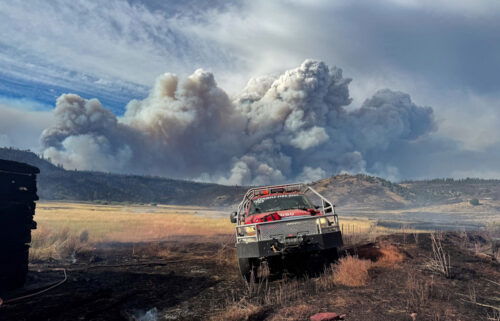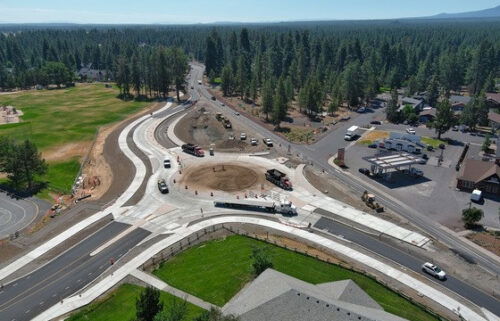Deschutes commissioners vote 3-0 to adopt county land camping restrictions, but much work remains
(Update: Correcting/revising ordinance info; adding rural ADU hearing, OK of rules limiting new resorts)
Seeking state, Forest Service help with issues, Chair Tony DeBone asks: 'Which law are we going to break?'
BEND, Ore. (KTVZ) -- Deschutes County Commissioners are moving forward with new restrictions for camping on county-owned land. After more deliberations and debate, commissioners held a first reading Wednesday on the camping code first proposed by Sheriff Shane Nelson, then revised by legal counsel.
Commissioner Phil Chang again voiced criticism, but later joined Patti Adair and Tony DeBone in voting yes.
"Generally, if you have agreement getting to a first reading, then you know the rest is sort of like glide path," Chang said after the discussion and vote.
Stressing the county’s new commitment to making that happen, Chang joined colleagues Patti Adair and Tony DeBone in a first reading of the ordinance. A second reading and final vote are planned August 9th (due to no meeting during next week’s county fair), and the ordinance says the rules would not take effect for another 90 days, which would be November 9.
Unless authorized by commissioners, "sleeping, camping, taking shelter or taking alternate shelter is at all times prohibited on vacant county land," the amended ordinance says. It says public use of county-owned or controlled property is limited to daytime use.
DeBone said, "Chapter 11.04 was expanded a little bit to make real clear, because right now what we're seeing is, you know, people setting up on our public land. This is tightening up the code package."
Open fires are strictly prohibited at all times on county-owned or controlled property, and no one can discharge or dump sewage or wastewater on county land, or "cause or contribute to the accumulation of solid waste materials," either.
Violations or failure to comply could be prosecuted as a Class A violation.
But Deputy County Administrator Erik Kropp told NewsChannel 21, "Staff has recommended that the code amendments not be implemented (i.e. inserted into the official county code) or enforced unless and until a minimum of two alternate shelter sites are identified and made available."
Chang said he supported the code language as revised by county legal counsel Dave Doyle, not the sheriff’s original proposal. But he also said moving people off their current site without an identified place to go would “actually make things worse out on China Hat Road,” just south of Bend, where fires and other issues have greatly worried, angered and upset neighbors and others.
Commissioners said the Forest Service has not adequately enforced the 14-day camping limit on federal lands, but that Nelson has been talking with federal officials to try to address the matter and see what can be done.
"If we had approved that package as written, we would have probably been dragged into federal court," Chang said. "And ended up being told by federal judges that we cannot enforce that code."
“I feel this document is the best we can do today,” Adair said, while DeBone said the ordinance “does narrow the path” going forward. He said federal federal and state officials “need to step up” to deal with the risk of wildfire and illegal activities.
Doyle said the best scenario would be a federal-county agreement on enforcement by the sheriff’s office, similar to the noise ordinance that deputies enforce at Elk Lake.
He said the alternate outdoor shelter sites would have basic sanitation, water and trash service, “certainly more humane than ‘dirt world,’ the area of Juniper Ridge north of Bend that has similar issues of homeless residents.
County officials also have been pressing Gov. Tina Kotek for some sort of allowance of managed camps outside cities.
“Nobody responded to this” request, DeBone said. So between that issue and ones such as federal court rulings, he said it comes down to: “Which law are we going to break?”
Adair bristled when Chang brought up his colleagues’ withdrawal from a proposed managed camp last year on Bend’s south end. She said the acre parcel “was so minimal” and there were 44 empty shelter beds at the time.
“The issue is much more complicated than that,” she told Chang. “Please quit saying that.” Adair noted the millions (much of it state and federal dollars) directed by the county to shelters and other projects to help deal with the homeless issue.
Before his yes vote, Chang said, “In voting on this, we are making a verbal commitment to the community to do more on outdoor shelter and managed camps.”
Also on Wednesday’s full commission agenda, commissioners approved a 10-year ground lease with the city of Redmond for 12 acres of county-owned property along Highway 126 in east Redmond for Oasis Village and similar projects to help the homeless.
Oasis Village plans to place 15 shelter units there to start and a future expansion of up to 40 units. The county says the rest is likely to developed for managed vehicle camping, known as “safe parking” projects elsewhere in the county.
The state has provided nearly $1 million for infrastructure development on the site and to build a community building with restrooms, showers, a laundry, kitchen, a common room and meeting space.
Before the camping code discussion, commissioners held a public hearing on a somewhat related issue – updating county regulations to reflect two new state laws to allow more “accessory dwelling units” by existing homes on rural parcels, to boost the badly needed supply of housing.
It’s not a requirement to address the topic, but once a local government dives in, there are a host of issues to decide on more rural ADUs, from how to measure the requirement that the new homes be within 100 feet of the existing one, as well as impact issues from water and traffic to sewer/septic to wildlife habitat, fire and wildfire risks and the like. The new smaller homes also can’t have more than 900 square feet of “usable floor area.”
Another issue – how small a lot could add a new ADU? There's discussion of making the minimum five acres in the south county, where nitrate from septic systems have led to decades of groundwater concerns.
There also was among the public testimony discussion about not knowing how many technically illegal second homes already exist on rural properties, and how the new rules could do more to help bring them into compliance than actually lead to new homes.
Commissioners plan to deliberate how to proceed at their meeting in two weeks.
On another topic, commissioners also approved amendments to destination resort rules that conform with state law that say new resorts within 24 miles of a large city can only have housing needed for staff or management.
This was a 2-1 vote, with commissioners Chang and Adair in favor and DeBone opposed to the new resort restrictions.
Central Oregon LandWatch said it had proposed the change to "prevent new sprawling luxury resort development."
“This is a huge win for Central Oregon’s livability," said LandWatch Rural Lands Program Manager & Staff Attorney Rory Isbell.
"By voting to approve Central Oregon LandWatch’s proposed amendment, the Deschutes County Commissioners have assured residents that the era of new mega-destination resorts is over,” Isbell added.





